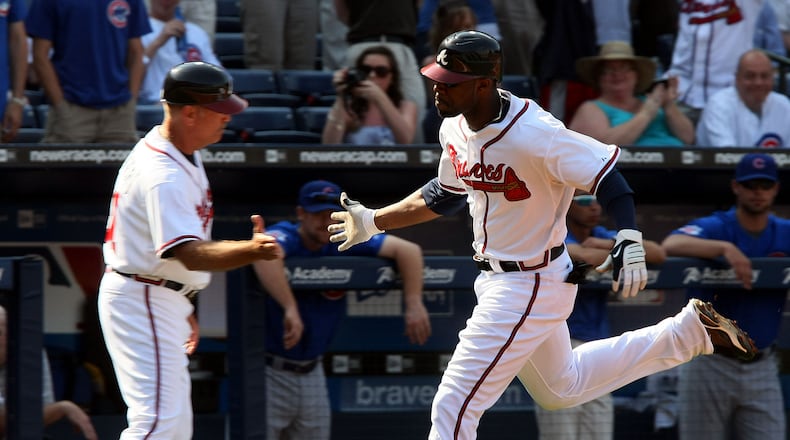It was 2010. Jason Heyward was baseball’s No. 1 prospect. In spring training, he launched baseballs that pelted cars parked behind the outfield fence at Disney’s Wide World of Sports. He was from McDonough. He was big, strong and fast. He was wise beyond his tender years. Crusty folks who’d seen it all had seen nothing like him, at least not in a while.
Opening day arrived. Turner Field was packed for Heyward’s debut. During batting practice, he conferred with Hank Aaron. Five of the first six Braves to face the Cubs’ Carlos Zambrano reached base. Heyward came to bat with two on and one out.
On his first big-league swing – he’d taken two pitches, neither a strike – Heyward lined a fastball over the right-field fence. He didn’t pause to admire his work. His head down, he dashed around the bases. He was low-fived by third-base coach Brian Snitker, high-fived by Brian McCann and hugged by Chipper Jones.
Two weeks later, Heyward homered off the Phillies’ Ryan Madson to send into extra innings a game in which the Braves trailed 3-0 with two out in the ninth. The next day, Bobby Cox – in his final season as manager – asked, “Did anybody think Jason Heyward wouldn’t hit a home run?”
More than being just the Next Great Brave, Heyward was seen as the Next Willie Mays. This wasn’t mere hysteria. Scroll down Heyward’s Baseball-Reference page. At age 20, his closest statistical comparison was … Willie Mays.
Heyward turned 33 on Tuesday. On Monday, the Cubs – who in December 2015 signed him to an eight-year deal at $184 million – announced they’ll release him this fall and pay $22 million to buy him out. He has been sidelined with a sore knee since June. Cubs GM Jed Hoyer described him as a “great teammate,” but the team is rebuilding.
(Yes, it’s a small world. On Saturday, the Cubs designated shortstop Andrelton Simmons, the former Brave who’d been baseball’s best defender, for assignment. In November 2016, he was dispatched to the Angels for Erick Aybar and Sean Newcomb. The Braves didn’t believe Simmons would hit. They were wrong. He had two good offensive seasons as an Angel. Only two, though.)
The Braves’ first major move after Frank Wren’s termination involved Heyward. In November 2015, the regime of John Hart and John Coppolella sent him to St. Louis for Shelby Miller. A year later, Coppolella flipped Miller to Arizona for Ender Inciarte, Aaron Blair and Dansby Swanson. The latter had been MLB’s overall No. 1 draft pick five months earlier.
Heyward’s career WAR is 38.7, a chunk of that because of defense. He has won five Gold Gloves. He was an All-Star as a rookie. That year, his WAR of 6.4 was fourth best among NL position players, trailing Albert Pujols, Joey Votto and Troy Tulowitzki. Over seven seasons as a Cub, Heyward’s aggregate WAR is 8.9.
The beauty of him as a prospect was that he could do everything, not just hit. The more he played, the less he hit. Theories abound, the most popular holding that his swing bore unfillable holes because he’s tall – though Freddie Freeman, his minor-league roommate, is likewise 6-foot-5. Heyward’s career OPS+ is 101. League average is 100. Freeman’s is 139.
In February 2014, Wren gave contract extensions totaling $267 million to Freeman, Simmons, Julio Teheran and Craig Kimbrel. The idea was to prevent them from becoming free agents anytime soon. Heyward’s deal also was extended – for two years at $13M, leaving him on track to become a free agent. He spent the second of those seasons as a Cardinal, for whom he had his last excellent year. Then he signed with Chicago.
His finest moment there is regarded as the pep talk he gave after the long-suffering Cubbies blew a lead in Game 7 of the 2016 World Series and were headed for extra innings. (They won in the 10th.) Heyward didn’t start the first three games of the Series. Over those playoffs, he was 5-for-48 with one RBI.
Heyward’s career isn’t over. As noted, he’s a good teammate. Still, nobody who saw him in 2010 could have imagined any club paying him to go away. He was the Braves’ future when Chipper was about to exit, when Freeman was still in the minors, when Ronald Acuña wasn’t yet a teenager.
The 10 players to whom Heyward now bears the closest similarity: Lloyd Moseby, Chili Davis, Paul Blair, B.J. Upton, Bob Bailey, Jeff Francoeur, Rick Monday, Claudell Washington, Chet Lemon and Amos Otis. That’s not terrible company; seven were All-Stars. But the list doesn’t include Willie Mays.
About the Author
The Latest
Featured


